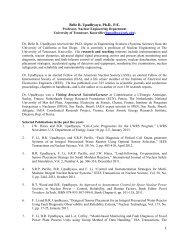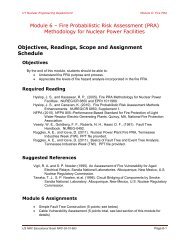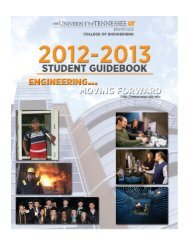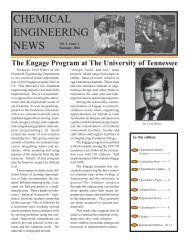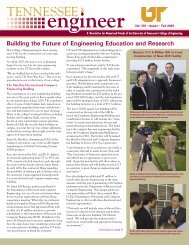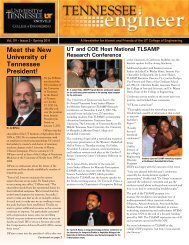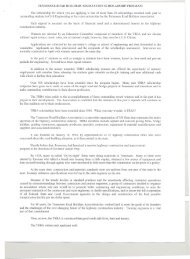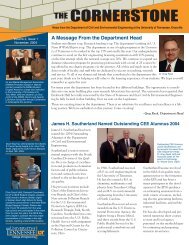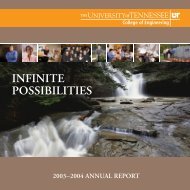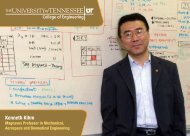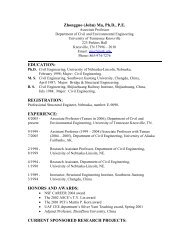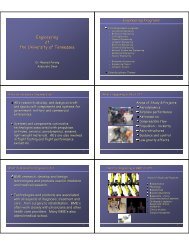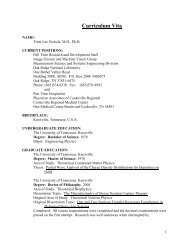ACADEMIC ADVISING SYLLABUS - College of Engineering - The ...
ACADEMIC ADVISING SYLLABUS - College of Engineering - The ...
ACADEMIC ADVISING SYLLABUS - College of Engineering - The ...
Create successful ePaper yourself
Turn your PDF publications into a flip-book with our unique Google optimized e-Paper software.
ENGINEERING <strong>ACADEMIC</strong> <strong>ADVISING</strong> <strong>SYLLABUS</strong><strong>ADVISING</strong> MISSION: <strong>The</strong> University <strong>of</strong> Tennessee, Knoxville places academic advising within the teaching/learning mission<strong>of</strong> the institution and recognizes it to be a critical component <strong>of</strong> students’ educational experience and undergraduate success.Faculty, administrators, and pr<strong>of</strong>essional staff promote academic advising as a shared responsibility with students.Academic advising serves to develop and enrich students’ educational plans in ways that are consistent with their personalvalues, goals, and career plans, preparing them for a life <strong>of</strong> learning in a global societyI. STUDENT LEARNING OUTCOMES:Students will demonstrate they know• Curricular requirements, progression standards, UTrack requirements, and course sequencing related to a chosen/intended academic program in order to graduate in a timely fashion• <strong>The</strong> career and pr<strong>of</strong>essional development opportunities available as well as on-campus support for identificationand exploration <strong>of</strong> career paths(Career Services Office, <strong>Engineering</strong> Pr<strong>of</strong>essional Practice Office)• Academic policies and procedures(Undergraduate Catalog)• Campus resources and support systems that promote academic success (Student Success Center)Students will demonstrate they can• Develop an academic plan and assess degree progress through graduation (Banner DARS, Undergraduate catalog)• Critically reflect upon academic and career goals• Develop skills and strategies for academic success that include accessing and using institutional resources,policies, and procedures• Take responsibility for making decisions regarding their academic successStudents will demonstrate they value/appreciate• <strong>The</strong> importance <strong>of</strong> academic planning and their role in the process• <strong>The</strong> importance <strong>of</strong> enhancing their degree with cocurricular/extracurricular and inter/intracultural experiences• <strong>The</strong>ir responsibilities as educated citizens <strong>of</strong> UT and <strong>of</strong> a democratic, diverse, and global society• <strong>The</strong> educational process and learning across the lifespanII. <strong>ADVISING</strong> POLICY:Prior to advanced registration, all students who have earned fewer than 30 hours at UT Knoxville or are on AcademicProbation, or have not declared a major within a specific college (undecided, pre-major, interest, undeclared) or areflagged as Off Track by UTrack system are required to meet with an advisor during each main term <strong>of</strong> the academic year(i.e., during fall and spring). All other students are required to consult with an advisor for a substantial conference duringa designated term each year. Students whose ID numbers end in an even digit are required to meet with an advisor duringfall semester. Students whose ID numbers end in an odd digit are required to meet with an advisor during spring semester.However, <strong>Engineering</strong> students are encouraged to consult regularly with their major advisor during each semester <strong>of</strong> theacademic year, especially if they plan to participate in internship or co-op positions that might affect class scheduling.Once a student in the <strong>College</strong> <strong>of</strong> <strong>Engineering</strong> finishes the first year coursework, they progress to their major and areassigned to a faculty advisor in their department. This is typically after the student completes Math 141-142 (Honors 147-148) and EF 151-152 (Honors 157-158). For Computer Science, these progression courses are Physics 135-136 (Honors137-138) and Computer Science 102 and 140. In all cases progression to the major includes being in Good AcademicStanding (2.00 or better cumulative GPA). For most students this will be at the end <strong>of</strong> freshmen year, but for some itmight be the following year in December if they finish these courses in the Fall semester.III. STUDENT EXPECTATIONS:• Schedule an advising appointment early each semester. To make an advising appointment, either call 974-4008 or come to room 202 Estabrook Hall and schedule one in person.• Keep any advising appointments you make. If you are more than ten minutes late to your scheduledappointment, you will be required to reschedule at another time.• Cancel any advising appointments that you are unable to attend, as these appointments will be used by otherstudents• Review your curriculum in the Undergraduate Catalog and the <strong>Engineering</strong> Student GuidebookRevised as <strong>of</strong> 5/1/2013. Page 1 <strong>of</strong> 1
• Ensure you are on track to meet progression standards or UTrack milestone requirements (if required for yourmajor, including GPA or course requirements) by reviewing your DARS report and UTrack report• Write down your current schedule and a tentative plan for next semester• Write down any questions you have for your advisor• Consult with your advisor and the financial aid <strong>of</strong>fice before making drastic changes to an agreed-upon schedule• Consult with your advisor and the financial aid <strong>of</strong>fice on issues related to academic progress, a change inprogram, registration for study abroad, internships and co-ops, courses to be taken at another institution,withdrawal from courses, or withdrawal from the university• Make final decisions and take responsibility for your academic career• Pay attention to semester deadlines• Read any e-mails or letters that are sent to you by your advisor, advising center, or academic college• Bring ROTC academic plans to your advisor early enough so that those forms may be filled out before they aredueIV. ADVISOR EXPECTATIONS:• Be accessible to you during reasonable hours• Provide a means through which you can schedule appointments• Understand the curriculum, graduation requirements, and university policies• Understand the progression requirements and UTrack requirements for the different majors in their college• Provide accurate information• Discuss specific university, college, and departmental requirements, procedures, and deadlines• Help you define and develop realistic goals and discuss the linkage between academic preparation and careeropportunities• Assist you in planning programs <strong>of</strong> study, both short-term and long-term, that are consistent with your abilitiesand interests; such as course load, academic background, program demands, and employment or personalcommitments• Refer you to other services, departments, and specific individuals as special needs are identified• Monitor your progress toward educational goals and keep accurate, up-to-date records <strong>of</strong> academic progress• Help you identify special needs and acquaint you with services and programs provided by the college and theuniversity• Respect your right to privacy <strong>of</strong> educational records and discuss confidential information only with appropriateindividuals and for the purpose <strong>of</strong> serving your best interests• Help you assume responsibility for your decisions and actionsV. IMPORTANT DATES IN THE <strong>ACADEMIC</strong> CALENDAR FALL/SPRING:August:January:• Be aware <strong>of</strong> drop/add dates and other deadlines especially • Be aware <strong>of</strong> drop/add dates and other deadlines especiallyfinancial deadlinesfinancial• Attend Study Abroad FairSeptember – November:• Schedule appointment with advisor to plan for Spring• Attend Study Abroad Fair hosted by Programs AbroadOffice• Attend Fall Job Fair hosted by Career Services (September)• Attend Co-Op Fair hosted by <strong>Engineering</strong> Pr<strong>of</strong>essionalPractice(September)October – November:• Register for classes once eligibleDecember:• Final examsFebruary – March:• Schedule an appointment to meet with your advisor to planSummer/Fall• Attend Spring Job Fair hosted by Career Services(March)• Attend Co-Op Fair hosted by <strong>Engineering</strong> Pr<strong>of</strong>essionalPractice (March)March – April:• Register for classes once eligible (summer and fall)May:• Final examsRevised as <strong>of</strong> 5/1/2013. Page 2 <strong>of</strong> 2
VI.<strong>ADVISING</strong> RESOURCES:• Academic Calendar http://registrar.tennessee.edu/academic_calendar/index.shtml• Banner DARS – look in UTK Student Academic Links in http://myutk.utk.edu• Career Services Center http://career.utk.edu/• Undergraduate Catalog http://catalog.utk.edu/• MyUTK http://myutk.utk.edu/• Student Success Center http://studentsuccess.utk.edu/• Study Abroad Office http://studyabroad.utk.edu/• <strong>Engineering</strong> Pr<strong>of</strong>essional Practice http://www.coop.utk.edu/index.htmlContact information for individual colleges:Agricultural Sciences & Natural Resources125 Morgan HallPhone: (865) 974-7303Communication & Information202 Communications BuildingPhone: (865) 974-3603Architecture & Design224 Art & Architecture BuildingPhone: (865) 974-3232Arts & Sciences313 Ayres HallAppointments: (865) 974-4483Phone: (865) 974-4481Business342 Haslam Business BuildingPhone: (865) 974-5096Education, Health, & Human Sciences332 Bailey Education ComplexPhone: (865) 974-8194<strong>Engineering</strong>202 Estabrook HallPhone: (865) 974-4008Nursing203 Nursing BuildingPhone: (865) 974-7606Social Work303 Henson Hall(865) 974-3351Revised as <strong>of</strong> 5/1/2013. Page 3 <strong>of</strong> 3



